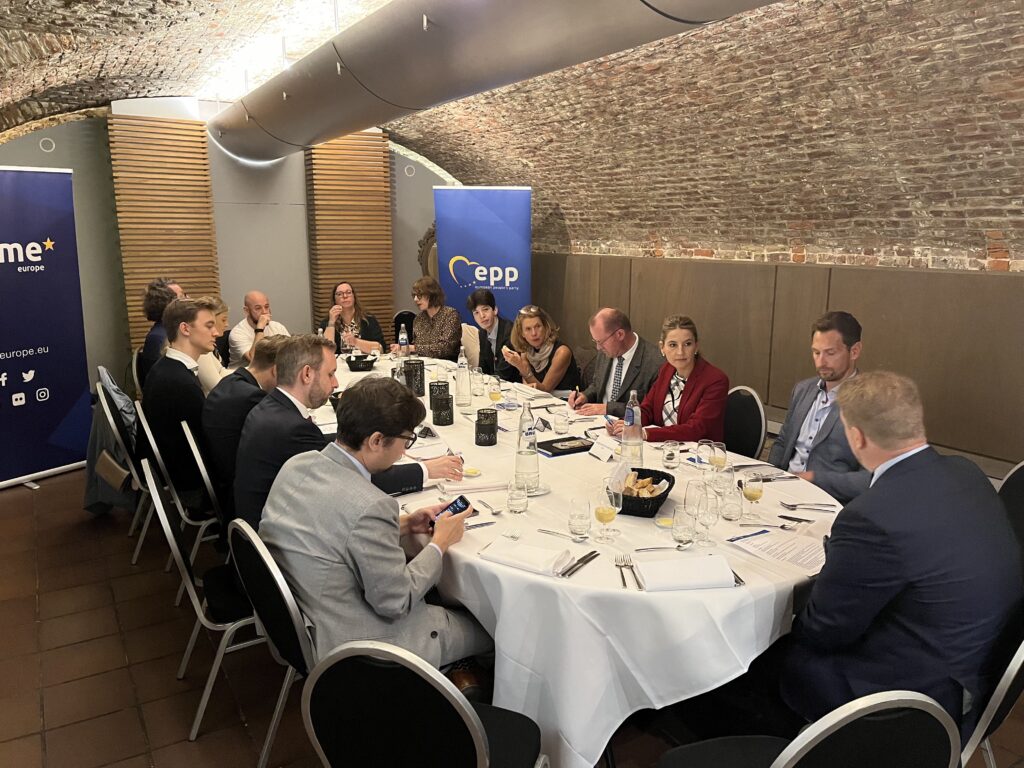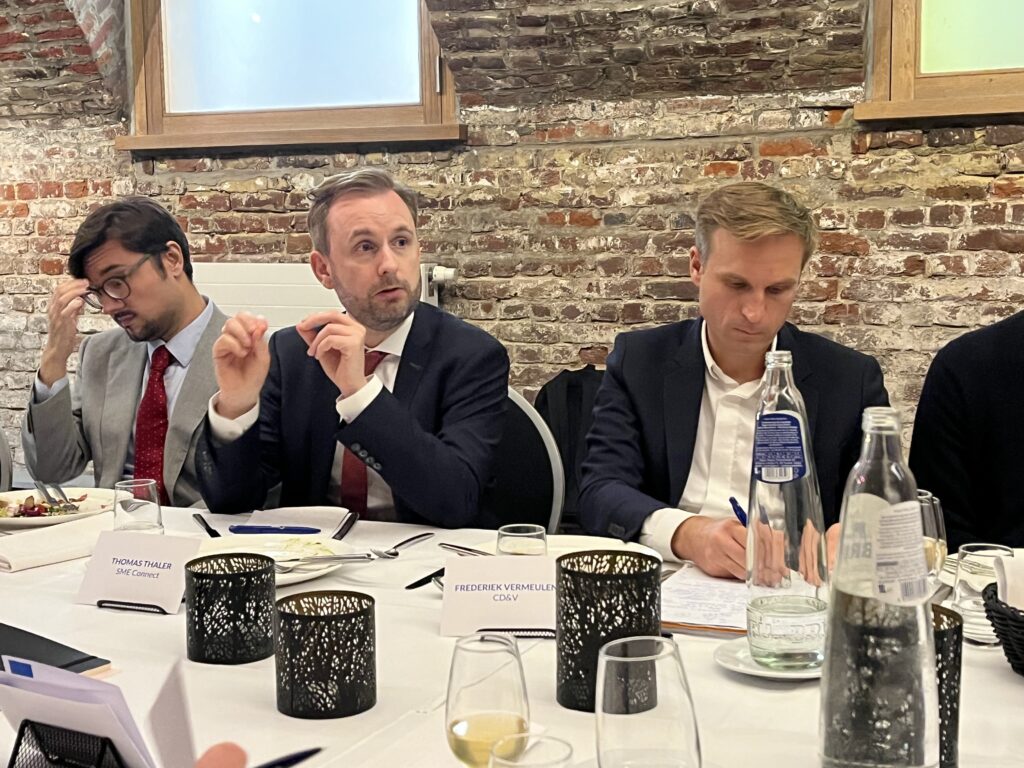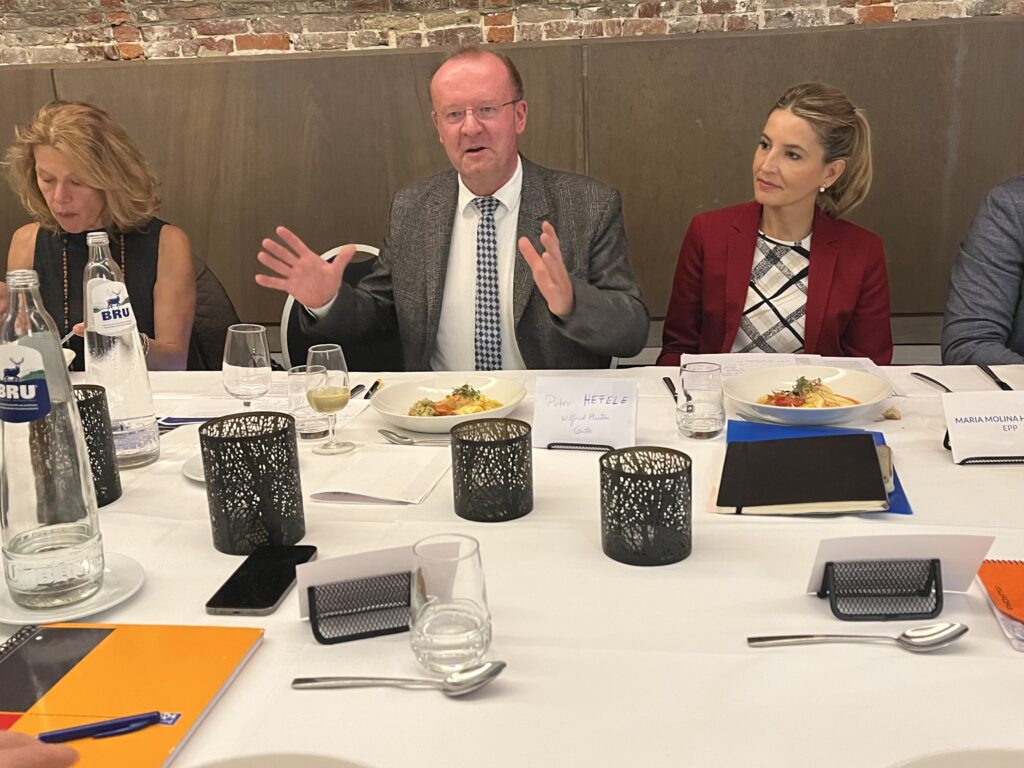Political Debate: How can the EU better address its political messages to OPCs and the self-employed?

On Wednesday, 1 October 2025, SME Europe organized a working lunch titled “Political Debate: How can the EU better address its political messages to OPCs and the self-employed?” at the Restaurant Maison du Luxembourg in Brussels.
The discussion featured distinguished experts including Frédériek Vermeulen, Secretary-General and Political Director of CD&V; Thomas Thaler, Thought Leader and Expert in EU Public Affairs and Government Relations and SME Connect Special Advisor for Trade; Peter Hefele, Policy Director for the Wilfried Martens Centre for European Studies; and María Molina Hurtado, Director of Political Affairs and Stakeholder Outreach for the European People’s Party (EPP), and was moderated by Horst Heitz, Secretary General of SME Europe.
Thomas THALER, Thought Leader and Special Advisor for Trade at SME Connect, emphasized that the EU needs to distinguish One-Person Companies (OPCs) from the broader category of SMEs. He pointed out that the EU defines SMEs as having up to 250 employees, which creates confusion and hides the needs of individual entrepreneurs. Thaler urged lawmakers to use the full term “One-Person Companies” in legislation, rather than acronyms, to make them visible and encourage specific support programs. He argued that OPCs face different challenges, such as lack of access to finance, social security, and cross-border complexity, which large SMEs do not experience. To address this, he proposed a “28th regime” — a unified legal framework that would allow one-person companies to operate under the same rules across the EU, especially important for those near national borders.
Frédériek VERMEULEN, Secretary-General and Political Director of CD&V, brought a political and philosophical perspective to the discussion. He argued that Europe has spent the last decade focusing on globalization and large corporations, neglecting one-person companies and the self-employed. Vermeulen identified five guiding principles for renewal: dare to promote economic growth, trust citizens instead of paperwork, ensure rules work in practice, set one date for new legislation, and simplify before digitalizing. He illustrated his point humorously with the “pizza rule”, suggesting every EU law should be short enough to read while a pizza bakes. He called for a culture shift in governance where each entrepreneur has one contact person for administrative issues, and where governments communicate decisions clearly and predictably, fostering trust and entrepreneurship.

Peter HEFELE, Policy Director at the Wilfried Martens Centre for European Studies, reflected on how communication between the EU and entrepreneurs often fails because of overly technical language and a lack of local engagement. He noted that people who run one-person companies do not have time to read the Official Journal of the European Union or understand hundreds of pages of directives. Hefele urged policymakers to work through local chambers of commerce and community associations, which already know their members’ needs. He warned against the political reflex of creating new institutions to solve old problems, saying that revitalizing existing local party networks is far more effective. Hefele also suggested that digital tools and artificial intelligence could help tailor communication to entrepreneurs, but only if used to simplify messages, not to add new layers of complexity.
María MOLINA HURTADO, Director of Political Affairs and Stakeholder Outreach for the European People’s Party (EPP), emphasized that policymakers must take responsibility for bringing EU institutions closer to citizens. She explained that political communication should not remain within the Brussels “bubble” but reach local entrepreneurs directly. Molina outlined four main priorities for improving the EU’s engagement with self-employed people: simplification of bureaucracy, easier access to finance and digital tools, clearer communication, and better social protection. She noted that every hour spent on administration is a lost hour for innovation and productivity, and that the EU must fight unnecessary red tape. As a best practice, she shared the Spanish example of a national “Plan for the Self-Employed,” developed after EPP discussions, to demonstrate how European dialogue can inspire local action.

Several entrepreneurs and representatives of small associations shared firsthand experiences of frustration with excessive bureaucracy and unclear regulation. They described how constant new rules make it nearly impossible to keep up, especially for one-person companies with limited time and resources. One entrepreneur spoke of running a podcast to explain new EU laws and said that regulatory updates arrive so often that it is impossible to focus on business itself. Others warned that innovators are leaving Europe due to slow digitalization and regulatory delays, resulting in a growing “brain drain” that weakens competitiveness.
SME advocates stressed that policymakers need to humanize their approach to communicating with entrepreneurs. They suggested that the EU should use marketing tools such as “personas” to visualize the everyday realities of self-employed people and better understand their motivations and constraints. Lilia HEITZ, Secretary General of SME Global of the IDU, highlighted that many policymakers still design rules without ever meeting those who are affected, creating a dangerous disconnect between legislation and daily life. She insisted that communication should not only occur during events but be maintained as an ongoing dialogue through simple and accessible channels.
Horst HEITZ, Secretary General of SME Europe, concluded the debate by praising the constructive tone of the dialogue and emphasized the need to maintain a permanent exchange between policymakers and entrepreneurs. Heitz reminded participants that SME Europe already runs outreach activities such as the Entrepreneurs’ Day and regional dialogues to bring local perspectives to Brussels. He underlined that OPCs and the self-employed are the backbone of Europe’s economy and deserve more direct representation in policymaking. Closing the event, he urged all participants to transform these insights into practical policy initiatives that would simplify life for entrepreneurs and strengthen trust in the European Union.

